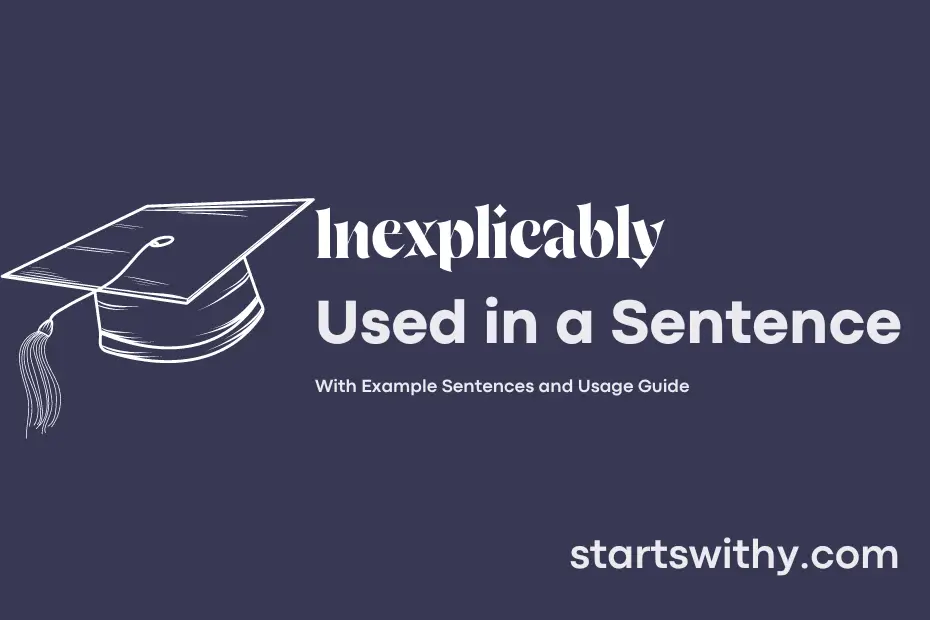Have you ever come across a situation where something happened without any clear explanation? That’s when the word “inexplicably” comes into play. “Inexplicably” is an adverb that is used to describe an action or event that occurs without a logical or understandable reason.
Whether it’s a sudden change in behavior, a mysterious disappearance, or a surprising turn of events, “inexplicably” is a word that helps convey the sense of confusion or bewilderment that often accompanies such occurrences. This word is a powerful tool for expressing moments of puzzlement or surprise when things happen unexpectedly or without a rational cause.
7 Examples Of Inexplicably Used In a Sentence For Kids
- The toy inexplicably disappeared from the shelf.
- The balloon inexplicably flew away in the wind.
- The lights went off inexplicably during the story time.
- The colors on the rainbow appeared inexplicably after the rain.
- The cookie inexplicably vanished from the plate.
- The flower bloomed inexplicably overnight in the garden.
- The magic trick happened inexplicably in front of our eyes.
14 Sentences with Inexplicably Examples
- Students were inexplicably greeted with a surprise quiz in their first lecture of the week.
- The professor inexplicably extended the deadline for the assignment, much to the relief of the students.
- The Wi-Fi connection inexplicably crashed during an important online class presentation.
- The cafeteria inexplicably ran out of chai during the exam week, causing chaos among students.
- The college website inexplicably crashed on the day of the submission deadline for project reports.
- The campus bookstore inexplicably closed early on the day students had planned to purchase their textbooks.
- The air conditioning in the lecture hall inexplicably stopped working during a heatwave.
- The final exam schedule was inexplicably changed at the last minute, causing confusion among students.
- The college canteen menu was inexplicably missing some of the students’ favorite dishes.
- The projector inexplicably malfunctioned during a group presentation, leading to a delay in the session.
- The college bus inexplicably missed its usual route, leaving students stranded at the campus gate.
- The sports event that students were looking forward to was inexplicably canceled without any prior notice.
- The library inexplicably closed early on the day before an important research project was due.
- The college authorities inexplicably shifted the location of a scheduled workshop, causing inconvenience to attendees.
How To Use Inexplicably in Sentences?
To inexplicably is to do something in a way that cannot be explained or understood. Here is a simple guide on how to use this word in a sentence:
-
Identify the context: Before using the word inexplicably, make sure you understand the situation you are referring to. It is important to use this word when something happens in a confusing or mysterious manner.
-
Choose your sentence: Think of a scenario where something happens unexpectedly or without any clear reason. For example, “He inexplicably left the party without saying goodbye.”
-
Place the word in the sentence: The word inexplicably is an adverb, so it should be placed before a verb to describe how the action is carried out. In the example above, it describes how he left the party.
-
Punctuation: Remember to use correct punctuation when including the word inexplicably in your sentence. Commas can be used to separate it from the rest of the sentence if needed.
-
Practice using the word: Try incorporating the word inexplicably in different sentences to become more familiar with its usage. This will help you feel more confident using it correctly in future conversations or writing.
By following these steps and practicing using the word inexplicably, you will soon be able to incorporate it into your vocabulary with ease.
Conclusion
In conclusion, the sentences with inexplicably convey a sense of bewilderment or confusion. They highlight situations or events that lack clear explanations or reasons. These sentences often leave readers or listeners puzzled, emphasizing the mysterious or unexplained nature of the subject at hand.
By using sentences with inexplicably, writers can evoke a sense of intrigue and curiosity in their audience. These statements grab attention and prompt reflection on the mysteries and uncertainties of life. Whether in storytelling, analysis, or everyday conversation, the use of inexplicably adds depth and complexity to the narrative, prompting further exploration and contemplation of the inexplicable aspects of our world.



